Ed Friedlander, M.D.
scalpel_blade@yahoo.com
No texting or chat messages, please. Ordinary e-mails are welcome.
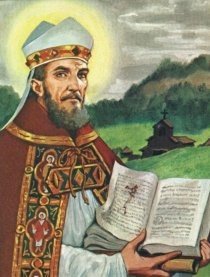 |
In 723, a Christian missionary named Winfrid cut down an oak tree sacred to the god Thor. This action is said to mark the beginning of the Christianization of the Germanic peoples, my own ancestors. |  |
|
Psalm 29
Ascribe to the Lord, you gods, ascribe to the Lord glory and strength.
Psalm 46: 9-11
It is he who makes war to cease in all the world; he breaks the bow, and shatters the spear, and burns the shields with fire. "Be still, then, and know that I am God; I will be exalted among the nations; I will be exalted in the earth." 1 Corinthians 8:4-6
Galatians 4:4
Galatians 5:22
|
The Challenge of Thor Henry Wadsworth Longfellow
I am the War God, I am the Thunderer! Here in my Northland, My fastness and fortress, Reign I forever! Here amid icebergs Rule I the nations; This is my hammer, Miölner the mighty; Giants and sorcerers Cannot withstand it!
These are the gauntlets
The light thou beholdest
Force rules the world still,
Thou art a God too,
Genesis 6:4 There were giants in the earth in those days.
|
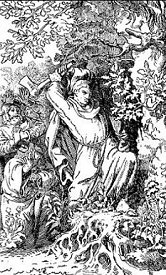 |
Tacitus on the Germans The Monastic Life from the Father of the Desert to Charlemagne German Missionaries Before Boniface -- Boniface was as much about bringing the region under Roman control as about bringing Christianity The Pope's 2009 tribute to Boniface -- doesn't mention the oak Reformation.org -- anti-Roman Catholic historian on Christians in Germany before Thor's Oak and the Roman mission. |
The felling of Thor's Oak took place at Geismar, now part of the town of Fritzlar in North Hesse, Germany. The people who lived in the area were mostly worshippers of the Germanic gods best-known to us by their Scandinavian names (Thor, Odin, Freya and the others from Norse mythology.) Germans called Thor "Donnar." The word "thunder" is cognate. Possibly the name of the Vedic thunder-god, Indra, is too. The Roman historian Tacitus thought that Thor / Donnar was Hercules, because of his great strength. Others thought he was Jupiter because of the thunderbolts.
The oak tree was the usual community meeting-place. Our sources tell us that Boniface greeted the local militia there. He stripped to the waist, took an axe, and chopped the tree down. The god Thor did not strike Boniface dead with a lightning bolt. The soldiers were then baptized into the Christian faith.
The fanciful embellishments came later. Some stories say the tree fell miraculously after a single blow. There's a version with Boniface rescuing a boy from human sacrifice at the hands of the druids. Sometimes Boniface even invents the Christmas tree for the occasion.
Pious legends aside, what really happened at Thor's Oak was politics. Boniface was sponsored and protected by Charles Martel, who was bringing the region under his control. Charles was facing the Umayyid invasions from Spain, and needed stability on the opposite side of his nation. The non-Frankish Germanic tribes were divided, and Charles sought the allegiance -- by persuasion or force -- of the local chieftains. They would become his "margraves", semi-autonomous allies who provided security for his northeast borders.
Of course, this is the same Charles who would stop Islamic expansion into Europe at the Battle of Tours / Poitiers in 732. The stabilization of the German frontier made this possible. And Boniface played a key role in handling the cultural concerns.
Anyone who has read the Iliad or old inscriptions knows how important "the gods" were to soldiers and governments of heroic societies. Particular gods were invoked to validate treaties, given credit for victories, and even "seen" helping in battle or during times of disaster. In times of great personal danger, people lay aside their doubts and pray for supernatural help. (The aphorism, "There are no atheists in the foxholes" is countered by opponents of religious infighting, who say, "If there were more atheists, there would be less need for foxholes.") In any case, the god(s) that one worshiped determined one's cultural identity. When Ruth says to Naomi, "Your god will be my god", she is joining a culture as much as choosing a code of behavior.
During the Middle Ages, a region often became formally Christianized through the mass baptism of its soldiers. This had happened in France under Clovis, and would happen in Norway under Olaf and in Russia under Vladimir. Boniface was at Thor's Oak to baptize the local army. They would now fight and worship alongside Charles Martel's main forces, which were Christian. Cutting down the tree reassured the soldiers that no harm would befall them from abandoning their old faith.
Of course, Boniface was not introducing Christianity. Our sources acknowledge that the Christian faith was already popular in the region. We read of bishops, regular services, and devoted missionaries. The words used in baptism and worship were not always the same as in Rome, and they did not use the Roman method for calculating the date of Easter. (The latter business was settled in Great Britain only centuries later, by a conference called by Margaret, the wife of Malcolm who appears in Shakespeare's Macbeth.) The Roman idea of clerical celibacy was not enforced. Local pastors conducted themselves as they thought best, and some had interfaith ministries, offering reverence to Thor and the other old gods as well as Christian worship. Our sources on Boniface also complain that missionaries weren't ordained, that they didn't take their hard questions for a decision from Rome, and that some were illiterate -- though decades later Charlemagne would become famous for having made the monks learn to read.
Christian readers who favor the congregational principle of church government, and who don't mind a pastor's family leaving cookies for Santa Claus, will wonder whether Boniface's taking charge was really a good thing. Probably the local warlords who stage-managed the incident at Thor's Oak didn't care one way or the other. The mass baptism marked the militia's joining the empire of Charles Martel, who was unifying the region and was allied with the more urbanized Roman culture. Whether or not the local Christians were glad to have a Papal legate exercising authority, he did offer good organizational skills and protection by the government.
From the wood of Thor's Oak, Boniface built a chapel. Being the Papal legate, he named the chapel for Saint Peter, considered the first Pope. One could argue that the incident at Thor's Oak marked the founding of the Holy Roman Empire. The site is now the site of Saint Peter's Cathedral in Fritzlar, with a modern-style statue of Boniface on an oak stump.
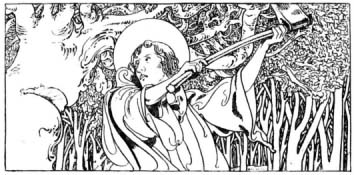 |
Battle of Tours / Poitiers -- Wikipedia Charles Martel -- Catholic Encyclopedia, appreciates Boniface Pippin was crowned king of the Franks by Boniface Charles Martel -- NNDB |
Drama or no, Germany had to become Christian. Progress can't be stopped.
In a savage era, the Christian faith was the best hope for political stability and recovering civilization. Christianity was the repository of classical learning, including secular and moral knowledge. Christianity was international, not bound a particular racial or cultural group. It brought members together with people from all over the known world, with the possibility of friendship and common interests. Even in a dark age, the idea of that one could walk in love and kindness with anyone must have appealed to many. Tacitus was very impressed with the political and military leadership opportunities available to women in the German society of his era. We do not know what opportunities for spiritual leadership were available to women in pagan Germany, but Christianity made much use of women's gifts. In fact, Saint Walpurga (cf. Walpurgis Night) was one of Boniface's distinguished female co-workers.
Christianity must also have been more appealing to thoughtful people. Whatever reasons you may have for believing or not believing, the Gospel offered a broader and more emotionally satisfying outlook than the traditional faith. If the Eddas actually reflect the beliefs of the cult of Thor and the other Germanic gods, happiness in the afterlife required death in battle. Perhaps beginning with Socrates (who expressed his doubts about "the gods" of polytheism), the classical philosophers taught that happiness in the afterlife was available to anyone who had tried to practice justice, wisdom, courage, and temperance. Christianity continued this wisdom tradition, offering happiness as a result of doing good and trusting God.
In a way, Thor appeals to the most simple-minded folk in a way that Christ cannot. One could see his hammer-blows in the lightning. The God of Abraham, Isaac, Jacob is not a nature-god. (Perhaps this is why the Torah prohibited making pictures for use in worship.) According to Bede (and I believe he is correct), evidence for the Christian faith comes primarily from the high quality of the scriptures, the impact for the better on human lives, and certain widely-reported experiences that seem paranormal, often around the time of death. Christianity is more subtle than superstitions about nature. But by the late 700's, people surely had begun to realize that lightning must have a natural cause, and that Thor's hammer is fiction.
I've been told that civilizations progress from animism and magic thinking, through a time of heroic polytheism, and then to monotheism and a focus on good living and kindness to others. If this is correct, then even non-Christians can appreciate Boniface as the bringer of a higher ethic.
According to Bede's history of the English church (book II), when one of the Saxon kings was considering with his council whether to adopt the Christian faith, one of the Druids stood up. "Our lives are like a bird that suddenly flies into one of our homes. It flutters around, and then flies out again. We do not know where it comes from, or where it goes. I seek Eternal Life in Christ." No one else had anything to add, and everybody became Christians. Read about it here. It's a great story, and maybe even a true one.
However, we hear nothing about any king or druid asking the Pope to send a delegation. When Rome finally did ship its representatives to Canterbury, they were mostly ignored by the already-robust British Christian community. And we read nothing about the early kings trying to suppress devotion to the old gods.
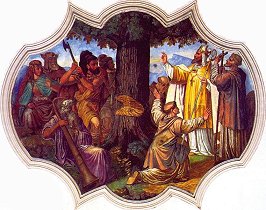 |
Germany -- A Country Study Memoirs of a Priest -- "Saint Boniface was an interesting guy..." |
Born and educated in what is now England, Winfrid (whose name means "friend of peace") joined the Benedictines, was ordained priest, and showed great intelligence and leadership ability. He chose a career as a missionary, and after some early failures and successes was selected by Pope Gregory II (who nicknamed him "Boniface", or "Maker of Good") to lead the Christianization of the non-Frankish Germanic tribes. Boniface went on to serve as a capable administrator, unifying German Christianity and became Primate of Germany.
On June 5, 754, the eve of Pentecost, Boniface and a few dozen of his fellow-missionaries were killed at Dokkum, Friesland, in the Netherlands. The place is called Moodrwoud ("the murderwood").
Now an old man, Boniface had resigned as bishop and returned to spreading the Gospel on foot. Friesland was still non-Christian territory. Our sources tell us -- and we can believe or doubt -- that Boniface and his team were destroying non-Christian places of worship where they knew they were not welcome. The Pentecost-eve event was to be a group baptism. When Boniface and his companions arrived, they were greeted not by the faithful but by a mob of very angry pagans. Afterwards, a bloodied copy of Anselm's book, "The Advantage of Death", was found near Boniface's body. This was improved in the retelling to Boniface's having been stabbed to death through his Bible or prayer book.
If we believe that his group was destroying the indiginous people's holy shrines, then Boniface was asking to be murdered. In any case, he knew the risks of proselytizing in enemy territory. Did his government put "the old guy" up to this, hoping for the political gains from a martyrdom? Did he himself seek a martyr's crown? Did his companions realize the danger? Does the fact that Boniface was carring a book by Anselm about glorious death suggest this dark motive for his journey? Did Boniface consider that he was leadering his companions to their deaths? Did they realize it? Did they discuss the risks? As he died, did Boniface reflect that this was the kind of death that would guarantee Valhalla to a non-Christian?
These are unsettling questions. We will never know the answers.
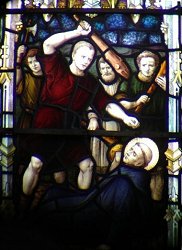
|
I think with these facts before you, you will unhesitatingly render a verdict of suicide while of unsound mind. It is the only charitable verdict you can give upon one who was, after all, a great man.
|
Whatever we make of his death, there is no question that Winfrid-Boniface was an effective Christianizer. Officially and politically, he was the Pope's legate and Charles Martel's man for cultural affairs. But what kind of pastor was he? Soldiers since the time of the Iliad have sought help from their gods without being preoccupied with theology. Army chaplains and people bringing the Gospel to "indiginous peoples" are not noted for focusing on subtleties of doctrine. They provide guidance, emotional support, and good examples for the troops.
The following prayer, attributed to Boniface, probably shows us the man.
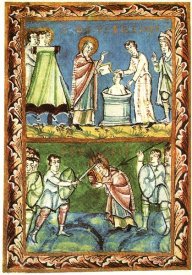 |
|
This looks totally genuine to me.
For starters, Boniface's prayer is INTERFAITH. Apart from the standard Christian last line, it's one of those rare prayers that almost ANYONE who believes in one or more divine beings can use. If you're thinking, right now, that the man who cut down Thor's Oak exemplifies bigotry, then the prayer shows us a very different person. And if someone were to draft a bogus prayer to attribute to "the great opponent of paganism", there'd probably be some sign of religious intolerance. I see nothing of the sort here. The goodness seems genuine.
Second, Boniface really asks for nothing specific, only guidance and a chance to express his gratitude. This is the sort of prayer that springs from the depths of a genuine, living faith.
Finally, Papal legate or not, this is the prayer of someone deeply involved with real life. The author is not worrying about doctrinal problems. He accepts the limits of his understanding and ability. He believes he is helped and protected, but he does not presume to say exactly how. He wants to lead a good life. He is thankful that others are cared for as well. Probably he realizes that loving and serving God is inseparable from loving and serving those around him.
The kind of Christian that I'd like to be.
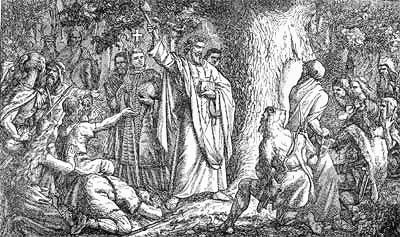 |
Willibald's Life of St. Boniface. Three Biographies of Boniface Spiritus Temporis -- St. Boniface UK Shrine of St. Boniface Life of Boniface Pius XII on St. Boniface -- Papal encyclicals site. Warning: This site is so poorly designed and programmed that it will crash your browser if you have "error detection" on. How's that for irony? Catholic Forum -- many links. The Monastic Life -- web book Dokkum, where Boniface and his companions were murdered, is also the most northern town in the Netherlands.
|
Further background reading: The Confessions of Saint Augustine. We know from Bede that Augustine was held in high regard in Winfrid's community. "The father of the Dark Ages" or not, Augustine still has many admirers. Every community has always had Christians of many different types. Boniface -- a man of action ministering to men of action -- probably never talked about feeling guilty over stealing a pear as a kid, or ever considered having wet dreams to be a "sin" to "confess".
We know the Germanic gods best from Scandinavia, though the Roman historians recognize that the gods of what is now Germany were mostly the same. Names cognate with Donnar / Thor are attested even in the Celtic nations. The pagan spritual leaders of northern Europe were the druids. They seem to have been much like their counterparts in another Indo-European civilization -- the Brahmins of the Aryan invaders of India. They were probably a civilian learned group, perhaps hereditary, whose authority was accepted by the military. The German druids must have been ministers in the cult of Thor.
For two thousand years, Christians have enjoyed the old tales of "the old gods", recognizing that they are fiction but appreciating both the fun and the good examples. Although Christianity taught that these gods are fictitious, they've been treasured in our cultural heritage. The classic myths of Greece and Rome gave us the names Dennis (Dionysus), Dmitri (Demeter), Cynthia / Cindy, Diane / Diana, and Juno.
CS Lewis loved paganism (both classic and Norse), and saw it as a path to Christ. Tolkien has his races of elves, dwarves, and humans worship gods such as Manwe, Aule, and Elbereth, modeled on the old Germanic gods. Even the Eddas, which are probably authored by Christians, were written to preserve the old tales for posterity.
Milton demonized the pagan gods in "Paradise Lost" and "The Hymn on Christ's Nativity", specifically saying that devils had presented themselves as the gods of Olympus. Yet his uses the name "Phoebus" (Apollo) for the Holy Spirit in "Lycidas", and elsewhere identifies Zeus / Jove with the One God of the Judeo-Christian tradition. And he has dozens of other examples of classic mythology presenting "types" prefiguring the Gospel.
I sometimes hear the question, "Do / did the ______ people really believe in their mythology?" One of my own experiences helped me decide. I was on a one-on-one tour of the principal place of worship of a US sect with an elaborate account of the universe, American prehistory, and so forth, none of which has any scientific or archeological support whatsoever. My guide was a great guy who obviously loved the clean-living, family-based ideals and sense of community that the sect brought him. After several hours, I tipped my hand and revealed that I knew much more about the sect's doctrines than I'd let on. ("Which star is Kolob?") My guide belly-laughed and then whispered quietly, "None of us really believe any of that stuff."
|
He's just a "pagan god" from Norse mythology.
But everybody likes Thor. The Poetic and Prose Eddas are our best sources of information on him. There are many other references as well. He was known to the Germanic people as Donner. In Iceland, Norway, Sweden, and Denmark, there are more personal and place names for Thor than from any other source. In Thor's honor, Thursday was usually the day for community events. Thor was a massively-muscled, red-bearded god who was usually said to be the son of the primary god Odin. His mother was the giantess Fjörgyn, whose name is perhaps cognate with that of the Baltic thunder-god Perkunas (Indo-European *perkuno), or Jöord, personification of the earth. Thor had a magic hammer that was his principal weapon, special gloves to wield the hammer, a magic belt that doubled his already-great strength, and a chariot drawn by goats that produced the thunder. Especially, his hammer, called "Mjolnir", or "thunderbolt", created the lightning and was a powerful weapon. Thor did not use sorcery. He fought fair. He did not lie or engage in diplomacy. He did not tolerate deceit or treachery from others. He was the friend of the human race. Thor was one of the Aesir, the family of gods most revered by the Scandinavians. (Another group of gods, the Vanir, were also revered in Norse mythology, and considered a separate family that had made friends with the Aesir. Perhaps they originated with a different group of people.)
|
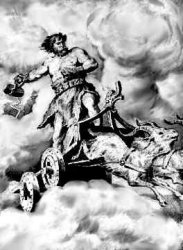 |
Thor was a tough god for a tough nation. Our Thursday is named for Thor, and the fifth day of the week is named for him in most other countries with Germanic roots. The Swedish scientist Berzelius named the element Thorium for the old god. Proper names from Thor are common in Scandinavia. I grew up on tales of Thor Heyerdahl, the great sailor who reconstructed old Polynesian technologies.
Thor is not a deep thinker, but he is a strong upholder of good, honest behavior. Loki, god of mischief, is sometimes his helper and sometimes his enemy. Thor's portfolio included maintaining law and honor, and promoting brave and effective combat, He was also invoked against natural disaster, especially as a rain-god against drought. The Vikings had the most to fear from freezing winter. At least the writers of the Eddas -- which came from Iceland -- knew about volcanos. The enemies of the gods lived in two realms -- one cold and cloudy, one of burning fire. Thor fought enemies in both places.
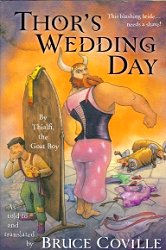 |
The Greek myths deal either with heroic conquests or the usually-sad origins of familiar things. |
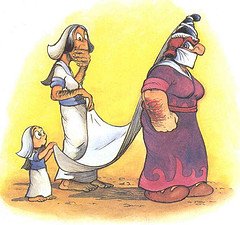 |
Despite all the fun, there is a distinctive, tragic undercurrent in Germanic myth that is lacking in classical cultures. In the oldest Greek myths (for example, Homer's poems), the dead all became mindless ghosts in dismal Hades. According to the Eddas, those dying of disease or old age would still languish in a gloomy underworld, but the souls of those who died in battle would be taken to party in Valhalla with Odin.
Viking society had a shortage of land for farming, and its economy was based on raiding. Because of the high latitude, rickets must have been prevalent, and this would have led to high mortality among the women in childbirth. There must have been a surplus population, especially of adult men. My best guess is that the legend of Valhalla was devised to encourage soldiers to fight recklessly. Ultimately, this made success in raiding more likely, and kept the population manageable.
I understand how men think. Probably the warriors realized this fact of life in their dark era. And they incorporated what they knew -- we won't survive at all unless we're willing to accept very high casualties -- into a religion that was anything but gloomy.
The myth about the duty to die in battle was backed up by the story that the gods themselves -- including Odin and Thor -- would someday be killed fighting their monstrous enemies.
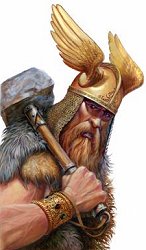 |
In another famous tale, Thor and some of the other other gods scouted the giants. |
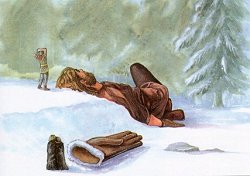 |
|
When the giants received their visitors, they proposed contests. Loki lost an eating contest and a foot race. Thor lost a wrestling match against an old lady, and was unable to empty the drinking mug. And Thor could not even lift the giants' cat. |
|
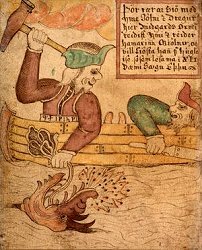 |
Thor once went fishing with the giant Hymir. (Perhaps he is the same as Ymir, the original giant.) The giant warned Thor not to go too far to sea for fear of the Midgard Serpent. |
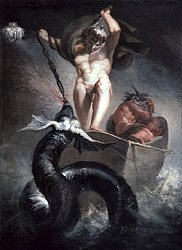 |
|
Thor and the Snake of Midgard -- including Elfwood painting Thor and the Midgard Serpent Thor and Midgard Serpent Thor and Giants -- adapted from the Eddas |
 |
|
One of the most appealing things about Thor is a number of
statements, including two from the Eddas,
that he had built a happy place for his society's
non-combatant males in the afterlife.
Tacitus wrote about the German non-warrior class, which we would call "serfs" or "slaves." He was amazed by how well they were treated, how rarely corporal punishment was required, and how seldom they disobeyed or deserted their masters. According to the Poetic Edda, the enigmatic Odin received the souls of those who fell in battle. However, Thor had an even larger house ("Thrudvangar" or "Bilskirnir") to which welcomed "thralls". Despite the overall emphasis on dying heroically in battle, it's clear that Germanic paganism offered servants, too, a place with the beloved rain god. | 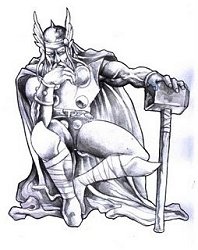 |
|
The old Germanic hero was expected, at the end, to die in battle.
This was often a lonely defeat, as we read in "Beowulf".
According to the Eddas, Thor would perish at Ragnarok, an apocalypse called the Twilight of the Gods. Thor would kill the Midgard Serpent, the snake that encircles the earth. After taking nine steps backwards, he would be overcome by the serpent's poison. Thor's sons would survive, along with some of the other more peaceable gods, in a new creation. Probably the theme (as in Beowulf) is that although individuals perish in battle, their deaths enable society to survive. |
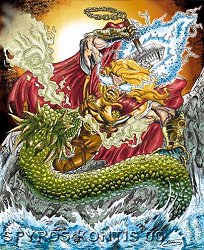 |
|
Thor's Home Page -- folklorist's site, very nice Viking History -- shows Thor, Hymir and Serpent Thor -- includes Fantalov paintings Thor Painting by Black Mamba, and much more Sacred Texts -- Tales of Thor, including Fogelberg statue Thor -- Leif Eriksson site Thor -- "Heathen Gods" appreciation site Thor in Vinland -- the North American Viking settlers included some who worshipped Thor rather than Christ Norse Myth -- en francais Thor -- encyclopedia of myths Thor and the Giants | 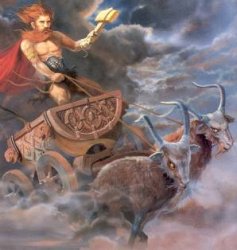 |
Thor's Duel with Hrungnir -- scholarly paper going much beyond; Thor takes part in creation, against the powers of both cold and fire
A History of Pagan Europe
Among the Aesir, Thor is the only one who is called "the friend of man" (vinr verlidha)
Poetic Edda -- Mrs. Hymer calls Thor "Friend of Man"
The Gods of Our Forefathers -- Thor is best loved
The Call of our Ancient Nordic Religion
Eddic Mythology

Oak Tree -- Google Earth |
When I was a young child, we lived a short walk from a historic Indian council tree, actually a group of three trees where the Potowatomie Indians would meet. I remember my family and the entire community being outraged when the famous trees were cut down in 1956 by developers. The truth used to be online but now you can see a sanatized version here. I've heard that JRRT originally sat down to write "The Lord of the Rings" after the people at Oxford cut down an ancient tree.
|
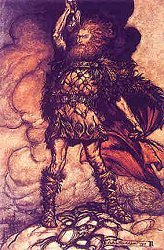 |
Golden Bough -- Worship of the Oak
If I were asked what I would most like to see change in our world, I would answer, "I want to see a world where religious differences no longer make people hostile to one another. I want organized religion to stop peddling hate. I want complete freedom of choice in matters of faith, limited only by respect for the common laws of humankind." You can cite your own examples.
I admire Boniface, and I know that he needed to cut down Thor's oak to reassure his people that the old gods would not take revenge. But the whole story is spoiled for me because the mass conversion was mandated by the government.
The Bible never claims that other nations' gods are evil spirits. Elisha even allowed Naaman to continue to take part in the Syrian cult of Rimmon, even though Naaman knew that Rimmon was just make-believe. ("Bowing to Rimmon" was the precedent, until Antiochus tried to force his own religious intolerance on the Jewish people.) The Old Testament simply ridicules belief in idols, and says up front the other gods -- or at least their powers -- are imaginary. The New Testament also suggests that perhaps the old gods now serve the One God in Christ. Paul reminded people who had scruples about eating meat killed in pagan temples that the old gods "have no real existence", and that as long as nobody else nearby got upset, worrying about this was silly.
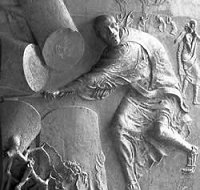 |
Historically, "demonization" means telling folks that their old gods were evil spirits. Especially in left-wing discussions, "demonization" also means saying anything that the discussant can't deny but doesn't want to hear. (For example, in 1995 some leftists at U. of Virginia complained I was "demonizing" Stalin when I reminded them that he had killed tens of millions of his own people.)
Do the pagan gods serve the devil? The Church Fathers were divided. Justin Martyr thought Socrates was guided by the Holy Spirit, while Tertullian saw all of classical learning as satanic. Cyprian, the generally-likable bishop of Carthage, was prosecuted only when he rabble-roused his congregation into vandalizing non-Christian places of worship.
Boniface probably did not demonize Thor, but simply showed everyone at Thor's Oak that nothing bad would happen by their leaving his cult. Later baptismal formulas from the region do include renunciations of some of the Germanic pagan gods and the "fiends" with whom they are allied. A few old sermons by German preachers urge folks to discontinue worship of the old gods in their homes. One sermon even warns against "dough idols", i.e., specially-shaped cookies. ("Give your people a break, Pastor. Gingerbread Thors aren't a peril to anyone's soul." -- Ed.) And we even have an old blacksmith's double mould, for making either cross amulets for Christians or Thor's-hammer amulets for old-believers.
|
My own life-experience is that the Christian faith, as people actually live it, is by far the strongest power in the world, and on balance a tremendous force for good. Organized religion is merely the tip of the iceberg, the "outward and visible sign of an inward and spiritual grace." And I've observed that good people from all backgrounds find themselves drawn to Christ. Hence my emphasis on religious tolerance -- since I really believe in the power of Christ, I also believe in evangelizing only by example and offering friendship. (Forced conversions are the mark of proselytizers who themselves have no real faith -- a point made in a 2008 talk by the Archbishop of Canterbury.)
If your experience has been different, you must conclude that I am wrong.
European Paganism -- old book with accounts of "Christians" vandalizing the holy places of Thor and other gods
| 1. Yes, my sons. Thor is your ancient enemy. He is an evil spirit. Our scriptures tell is that there are spiritual beings ("demons" or "devils") that hate God and therefore seek to corrupt and bring sadness to the human race. Thor must be one of them. Think about it. You were taught that there will never be an end to war and senseless killing. Thor's wicked priests taught you to throw your lives away for nothing. If it seemed that Thor answered a prayer, it was only done by your spiritual enemies for your final ruin. But be glad. By cutting down the old tree, we proved that these evil spirits need no longer have any power over you, and you don't have to listen to their lies. You are free to worship without fear, and to share in a better life. | 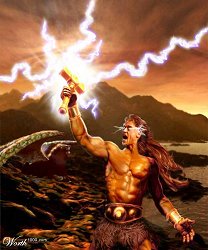 |
|
2. Yes, my sons. Thor is your ancient friend. He is a good angel.
Our scriptures teach that the One God
reveals Himself to every nation.
And they tell us that when the world was young, we were under the care of the nature spirits, "the elements", like Thor.
Over time, God teaches us more and more.
Indeed, Thor's ministers
already knew about the coming end of our world,
and that it will be replaced by a better creation.
In the end, all will come to the One God as He is revealed in Christ.
Thor is one of God's many servants in heaven.
Many people have seen these supernatural beings.
They are His creations like we are, only
much stronger and wiser than us.
Their home is in heaven, and it's true that
they welcome us after we die.
And Thor himself may well
have rescued you in situations of mortal
danger.
But Thor and the other angels never wanted to be worshipped.
Now that you have accepted Christ as commander-in-chief,
you are a fellow-warrior with
Thor in an army that will not be defeated.
And despite the old tales, Thor will not die. He will be your friend
and companion forever.
|
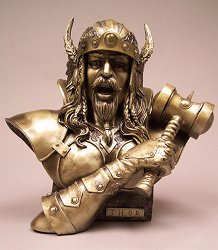 |
| 3. No, my sons. Thor is make-believe. Fun is fun. But we are adults. The tales about Thor teach children to be brave and to get along with each other. And even adults enjoy the tall tales. But why pray for help and guidance to someone that you know perfectly well never existed? You know that lightning isn't really the result of someone throwing a magic hammer, and the thunder that follows isn't the hoofbeats of giant goats. By becoming Christians, you are giving up this foolishness for a faith based on a cosmopolitan ethic of kindness and good-will. The truth will set you free from superstition and worry. We do not yet know the causes of thunder and lightning, but it must be something natural -- and ultimately discoverable by humankind. Ancient Greeks and Romans tried hard to make sense of the natural world, and with some success. Christians are now stewards of this knowledge. Let superstition die. Humankind will surely discover more of nature's secrets. Perhaps someday we will even harness the power of lightning. |
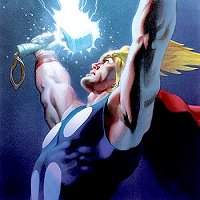 |
|
4. Yes indeed, my sons! YOU are Thor!
Thor represented everything that was
best in your culture. He was your courage in battle and your
ability to survive in a harsh natural world.
He was your pride in work well done, he was your forthrightness,
and he was your
good humor and sense of fun.
In fact, Thor even had a special welcome for your slaves -- a kinder and more
generous offer even than the old Greeks and Romans ever considered.
We're all Christians now, building a better world.
Rather than a false god to be discarded,
Thor can still be your team symbol, your mascot, an image to honor and love.
|
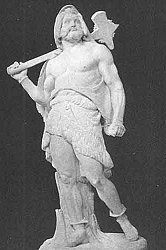 |
They must have asked. What answer do you think Winfrid Boniface gave?
What answer would YOU give?
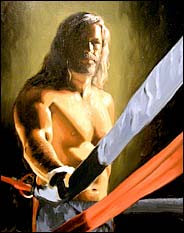 "Undefeated" |
Especially as a male, I welcome the tendency of today's iconographers to show Christ and His followers as they must have looked -- robust, physically-fit men. Carpentry isn't a career for weaklings. Commercial fishing remains our world's most dangerous job. And Christ withstood torture without breaking. |
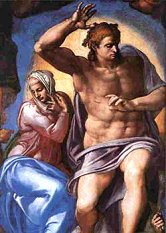 |
|
Probably no one today believes in a literal Thor who makes thunder and lightning, any more than people believe in Santa Claus, the Grim Reaper, Mother Nature, Jack Frost, Lady Justice, or Lady Luck. However, Thor is still well-liked.
Scion -- adventure game from White Wolf, in which human player characters are the children of the old gods. On the cover, Eric Donner is Thor's natural son. Wagner's Operas feature Thor as a baritone. Some people like Wagner, though others don't. According to Mark Twain, "Wagner's music is better than it sounds." Marvel Comics features Thor. In the backstory, his father Odin sends him to live on earth, minus his memories, as a handicapped medical student. Thor Movie scheduled for release in 2009.
|
 |
Now please forgive my frankness. If you are easily offended, or want something nice, stop reading and click here.
|
The book I enjoyed reading most in 2007 was David Murrow
on how today's organized Christian religion is failing specifically
to meet the needs
of men. I found the book entirely true-to-life and decided that, if
anything, the author understates his case. The root cause seems obvious to me. Today's churches -- conservative and liberal -- ignore the Biblical faith to please secular special-interest groups. You'll have to decide for yourself who's right. Here are the facts, as the author and I see them. Call me a horrible person if you want. |
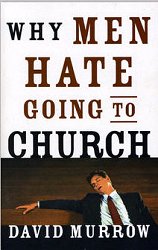 |
A man wants a leader and guide and friend, not a rescuer. Few men want heart-religion, with a focus on feelings. A man wants to be part of a victorious army, working efficiently and effectively, following a good leader. And this is the Biblical norm. Most often, Christ says, "Follow me."
Men have no use for superstition, or for stuff that obviously doesn't square with the observable world. Murrow describes "God-versus-science sideshows." The special-interest group that's targeted are people who are scientifically illiterate. Ignorant people love this stuff. But every informed man today knows that whatever we mean by the doctrine of "creation", anti-evolution talk is elaborate fakery. Even if he's not scientifically sophisticated, sooner or later a man finds out that the creationist "persecuted geniuses" consistently and famously refuse to testify in the courts of law under oath. Lying is a sin. The man wises up, stops shelling out the money, and often decides that everything else he's been told at church must be lies, too. I've run into this in real life dozens of times. I'm sorry it happens.
Saving the best for the woman you will marry is still the Christian ideal. Decent men love responsibly. But men have no respect for impossible standards of abstinence. Telling a boy that what happens to all of us males around puberty is a "sin", or that "impure thoughts" need to be forced from the mind, simply prepares him for a life of hypocrisy. Everybody's seen this. Men have only contempt for prohibitions on birth control. And Murrow contrasts the eternal sex in Mormon and Muslim heavens to the un-Biblical but pervasive "Christian" images of eternal choir practice.
I'll belt out "Onward Christian Soldiers" or "From Greenland's Icy Mountains" with the rest of the guys. But a man won't sing "In the Garden" or the like except to score points with his woman. Sorry -- it's the truth.
A man who observes petty traditional abstinences from beer, Playboy, action movies, living-room poker, and barracks talk is probably not "deeply religious". I'll wager that he's just terminally henpecked. And few men really see any reason to read the Bible uncritically, respect special pleading to explain away difficult sections of a supposedly "inerrant" book, or accept an "infallible" church authority.
Right or wrong, today's liberal churches disgust the average man. And "disgust" is the right word. We have no use for "sensitivity training", emphasis on feminist issues, a focus on grievance-group politics, "inclusive language" militants pretending to be outraged when someone calls God "Father", ideologies that undermine our authority in our own homes, or the now-commonplace appeals for sympathy for radical anti-American Islam. During the 1990's, the anti-male rhetoric at the Episcopal Cathedral in ______ got so inflammatory and ludicrous that I wrote a letter of protest to the bishop. He wrote back that he agreed, but that there wasn't really anything he could do. I am not making this up.
Conservative or liberal, men do not like being told how to vote.
Murrow says that a church could measure its real effectiveness by the number of Harleys parked outside on Sunday morning. Probably every male visitor, Christian or not, can add something here.
A men's lodge with Thor as mascot, made up mostly of men who profess the Christian faith, could probably do more good for a community than most of today's right-wing and left-wing churches. ("Free auto maintenance and minor repairs for the poor every Thursday!") And today's churches -- both liberal and conservative -- could benefit from the example of Boniface of Mainz, the effective, bare-chested warrior-chaplain who cut down Thor's oak and paid with his life.
Of course, my prescription is, "Cut the crap. Preach the gospel. Live the gospel." Congregations might sometimes do it. Millions of individuals do it -- often on their own. Even when organized religion fails, it's still the imperfect visible sign of the Invisible Church -- the strongest force in creation. And the Church has won over the old gods, absolutely and unequivocally.
We see this victory whenever a human being -- male or female -- chooses kindness over convenience. Christ triumphs whenever someone finds the bigness of soul to forgive a wrong. Christianity has won whenever good people go about their business quietly, instead of boasting like Norse gods and bards. When people who have lived badly turn their lives around for the better, they go beyond the old pagan faith and perform the most typically Christian of all acts. The Invisible Church has always been there for me. Test it, and you'll find it's there for you. And even when someone breaks with an organized congregation out of a need for truthfulness, common sense, and common kindness, I say it's a victory for Christ.
Biblical Manhood -- like David Murrow and me, critical of both the Christian Right and the Christian Left.
Wise Macho Men Only Seek Him -- Chrisitan mainstream, critical of both left and right
Boniface took nine steps backward. He felt his blood wash over him. | Thor took nine steps backward. He felt the dead snake's poison wash over him. |
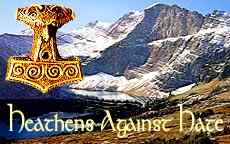 Heathens Against Hate -- anti-neoNazi site uses Thor's hammer as symbol
Heathens Against Hate -- anti-neoNazi site uses Thor's hammer as symbol
Toned-Down Version of "The Incident at Thor's Oak"
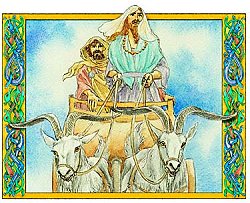 |